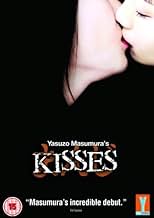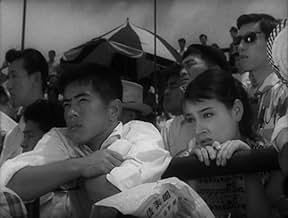Ajouter une intrigue dans votre langueStory of a young couple whose fathers are prison bound.Story of a young couple whose fathers are prison bound.Story of a young couple whose fathers are prison bound.
Histoire
Le saviez-vous
- ConnexionsReferenced in Century of Cinema: Un siècle de cinéma japonais, par Nagisa Oshima (1995)
Commentaire à la une
This is somewhat obscurely the first of its type in Japan, New Wave. This is less because of bold innovation on the part of the maker and more an inevitable consequence; the times were pulling in that direction, someone was bound to do it. It happened to be Masumura, fresh from an Italian film school.
Someone was bound to. Their generation would be fretting against the same limits at the same time; the old values had ruined the country, the films were boring, not in their image.
So it's revealing to see this in the context of what no longer lets the soul breathe. The film is about youths falling in love. There is no meddling from their parents, they are left alone in the world to figure it out. They meet in prison - unlike Ozu's kindly fathers, their fathers are doing time, one for embezzling, the other election fraud, pointing to the larger failure. One of them we see, a blowhard and fool.
Here's the same failure in a more intimate light. A lot of the film is devoted to the two youths running around trying to scrounge up money to bail their fathers out, filial piety says that must be their priority. But see how tiresome the film becomes when it's about finding money, as stifling for us as for the two lovers.
This in the Italian vein that probably still had major traction in Europe by that time, the wandering among tedious life as if to find an exit somewhere. Probably if you asked him at the time, remember still '57 so before the French, he'd say he was making a realist film.
No what's powerful here for me is the early segment of their falling in love by the beach that smells of summer. I saw this with a Hollywood melodrama of a year prior, the soulmate type of love was merely produced from air. How fresh here by contrast, how evocative.
This is because it springs from touch and shared presence. Their bike ride together through open air, holding tight on him through tunnels and onto a beach resort. Their playing around in waves, new for the time. Her falling down in the skating rink and being picked up again. Their dancing together in a crowded floor by nightfall, the day still not over, long enough for them and others like them to not have to worry about more than just now.
Each visual beat will stay with me more than several, more accomplished Wave films to follow. There's freedom here, openness that still charms. They're impulsive and goofy, not yet having to fret (like their French counterparts) about image and their place in their world and still have to be mature enough to worry about the mundane stuff.
Somewhat obscure then but important in its own right. Not for any radical light in which to see and contemplate self; for Godard this would be as a bunch of notations around image; Resnais would dive deeper in marvelous Hiroshima. No the importance is that it adroitly reverses Ozu and in the same beat crystallizes the new impulse for connection.
Someone was bound to. Their generation would be fretting against the same limits at the same time; the old values had ruined the country, the films were boring, not in their image.
So it's revealing to see this in the context of what no longer lets the soul breathe. The film is about youths falling in love. There is no meddling from their parents, they are left alone in the world to figure it out. They meet in prison - unlike Ozu's kindly fathers, their fathers are doing time, one for embezzling, the other election fraud, pointing to the larger failure. One of them we see, a blowhard and fool.
Here's the same failure in a more intimate light. A lot of the film is devoted to the two youths running around trying to scrounge up money to bail their fathers out, filial piety says that must be their priority. But see how tiresome the film becomes when it's about finding money, as stifling for us as for the two lovers.
This in the Italian vein that probably still had major traction in Europe by that time, the wandering among tedious life as if to find an exit somewhere. Probably if you asked him at the time, remember still '57 so before the French, he'd say he was making a realist film.
No what's powerful here for me is the early segment of their falling in love by the beach that smells of summer. I saw this with a Hollywood melodrama of a year prior, the soulmate type of love was merely produced from air. How fresh here by contrast, how evocative.
This is because it springs from touch and shared presence. Their bike ride together through open air, holding tight on him through tunnels and onto a beach resort. Their playing around in waves, new for the time. Her falling down in the skating rink and being picked up again. Their dancing together in a crowded floor by nightfall, the day still not over, long enough for them and others like them to not have to worry about more than just now.
Each visual beat will stay with me more than several, more accomplished Wave films to follow. There's freedom here, openness that still charms. They're impulsive and goofy, not yet having to fret (like their French counterparts) about image and their place in their world and still have to be mature enough to worry about the mundane stuff.
Somewhat obscure then but important in its own right. Not for any radical light in which to see and contemplate self; for Godard this would be as a bunch of notations around image; Resnais would dive deeper in marvelous Hiroshima. No the importance is that it adroitly reverses Ozu and in the same beat crystallizes the new impulse for connection.
- chaos-rampant
- 10 mai 2014
- Permalien
Meilleurs choix
Connectez-vous pour évaluer et suivre la liste de favoris afin de recevoir des recommandations personnalisées
Détails
- Durée1 heure 14 minutes
- Couleur
- Mixage
- Rapport de forme
- 2.35 : 1
Contribuer à cette page
Suggérer une modification ou ajouter du contenu manquant

Lacune principale
By what name was Les baisers (1957) officially released in Canada in English?
Répondre



















